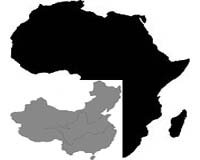 |
Khartoum (AFP) March 16, 2010 A large discrepancy over actual oil production figures in Sudan could fuel tensions between the North and South which share the proceeds, an international NGO said on Wednesday. Global Witness said that accurate production figures were important because a 2005 peace agreement between the north and south was predicated on an agreement to share oil revenues. It said that six months after it had first highlighted the gaps between official Sudanese figures and numbers given by a Chinese-led consortium in Sudan authorities had failed to address the issue. "Global Witness has discovered that oil production figures by the Chinese National Oil Company for 2009 for the blocks it operates in Sudan's Upper Nile State are 12 percent bigger than those published by the Sudanese government," the environmental watchdog said in a statement. "The difference in question -- 12 million barrels of oil -- is significant: The oil is worth 370 million dollars, and is enough to power a city in the US the size of San Francisco for a year," the statement added. "While it is impossible to know for sure which figures are correct, it is clear that both cannot be. "Six months after we first raised the issue we still haven't seen the reforms that are necessary and that have been promised," the statement quoted Rosie Sharpe, an investigator at the group, as saying. She added that, "the continued discrepancies are a cause for grave concern and cast a shadow over the prospects for peace." The two CNPC concessions account for about half of Sudan's current oil production, the fifth-largest producer in Africa, with reserves of more than 5 billion barrels. The concessions are operated by CNPC, Malaysia's Petronas, Sudan's state-owned Sudapet and other small shareholders. CNPC also shares in several other concessions, but Global Witness said production figures from those concessions were not studied, because the NGO was unable to see those figures. The division of oil revenues is a sensitive issue in Sudan, Africa's largest country, which was torn by a 1983-2005 civil war in which nearly two million were killed. The 2005 peace agreement between dictates equal distribution of royalties from oil found in the South but sold by the North, which has an oil pipeline and an export port. "The authorities in the North are responsible for stating how much oil was produced. The South has not way of checking whether these figures are correct and therefore whether the revenues the Southern government receives are correct," Sharpe said in the statement. "This is a critical issue and one which could be decisive in determining whether the upcoming referendum on independence passes off peacefully," the statement said. A referendum on secession for the South is scheduled for next year.
Share This Article With Planet Earth
Related Links Powering The World in the 21st Century at Energy-Daily.com
 Africa should harness Chinese oil-interest: analyst
Africa should harness Chinese oil-interest: analystCape Town (AFP) March 16, 2010 African states should harness Chinese interest as Beijing's demand for commodities drives growth on the continent and fuels capital investments, an energy conference heard on Tuesday. China's investment model in Africa, characterised by long-term capital concessional financing, was a developmental "no-brainer," Martyn Davies, head of the Frontier Advisory firm, told the Oil and Gas Africa ex ... read more |
|
| The content herein, unless otherwise known to be public domain, are Copyright 1995-2010 - SpaceDaily. AFP and UPI Wire Stories are copyright Agence France-Presse and United Press International. ESA Portal Reports are copyright European Space Agency. All NASA sourced material is public domain. Additional copyrights may apply in whole or part to other bona fide parties. Advertising does not imply endorsement,agreement or approval of any opinions, statements or information provided by SpaceDaily on any Web page published or hosted by SpaceDaily. Privacy Statement |